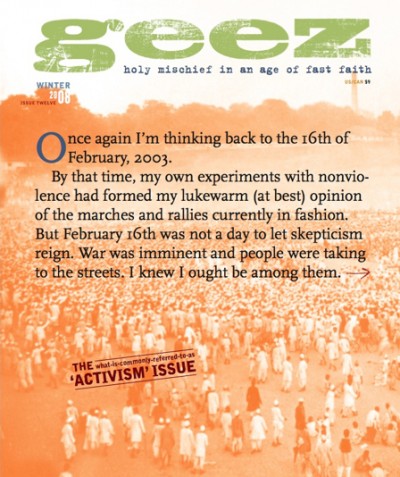Cultural activism
For me, cultural activism is campaigning and direct action that seeks to take back control of how our webs of meaning, value systems, beliefs, art and literature, everything, are created and disseminated. It is an important way to question the dominant ways of seeing things and present alternative views of the world.
This is a more savvy resistance which uses our media saturated society to develop new forms of actions that are ever shifting, mutating and always one step ahead of those who want to co-opt and restrain us.
For me, cultural activism is campaigning and direct action that seeks to take back control of how our webs of meaning, value systems, beliefs, art and literature, everything, are created and disseminated. It is an important way to question the dominant ways of seeing things and present alternative views of the world.
This is a more savvy resistance which uses our media saturated society to develop new forms of actions that are ever shifting, mutating and always one step ahead of those who want to co-opt and restrain us.
Insurrectionary imagination
An insurrectionary imagination is at the heart of cultural activism. It is a sense of possibility that is not limited by copying a pattern or following a design that somebody else created, or by what Augusto Boal (2002) calls the “cop in the head.” We all have that voice, the one that tells us our ideas are stupid, they won’t work out, they are too difficult or are bound to fail.
Cultural activism relies on killing the cop in your head and expressly tries to develop this insurrectionary imagination to create performances and actions. This living practice addresses complicated questions about how we build the world that we want to live in. Insurrectionary imaginations evoke a type of activism that is rooted in the blueprints and patterns of political movements of the past but is driven by its hunger for new processes of art and protest.
Dialogue and interactivity
Cultural activism tends to move away from one-sided monologues, speeches and propaganda into porous forms that use dialogue and interaction. Is it such a huge stretch of the imagination to believe that people can speak for themselves and ultimately have something to say about the world they want to live in?
Ideas are not harmless
Activists need to be careful and question the whole nature of ideas being viral, because freedom must involve thinking for yourself. This is why real engagement and creativity is so vital to the ideas of cultural activism, and should never be let go even if it seems easier just to copy someone else’s idea.
We have seen this with most forms of cultural activism – as people are hungry for answers and solutions they are quick to take up the next big trend in protest movements. While rebel clowning and clown training can be a way of healing the body and the mind from the social damage of capitalism, if it becomes a virus people will copy what they have seen either at protests, at the circus or on television. They will cut out the development of the insurrectionary imagination, and it is the development of this imagination that opens up limitless worlds of activism beyond costumes and stock gags.
Capitalism does its best to make us feel helpless – “Got to pay the rent and keep a roof over my head” – and convince us that we need to dominate others (both as individuals and as nations) to ensure our own freedom. Cultural activism is necessary to give us all the mental and physical tools we need to free our bodies and our minds. We don’t just rehearse the revolution, we practise it everyday.
Jennifer Verson is a freelance performance activist from the U.S. who trains people in the art of politically subversive theatrical performances. This article is a portion of her chapter, “Why we need cultural activism,” in Do It Yourself: A Handbook for Changing Our World (Pluto Press, 2007). Thanks to the editors for making it available throughout the Creative Commons. See www.handbookforchange.org



Sorry, comments are closed.